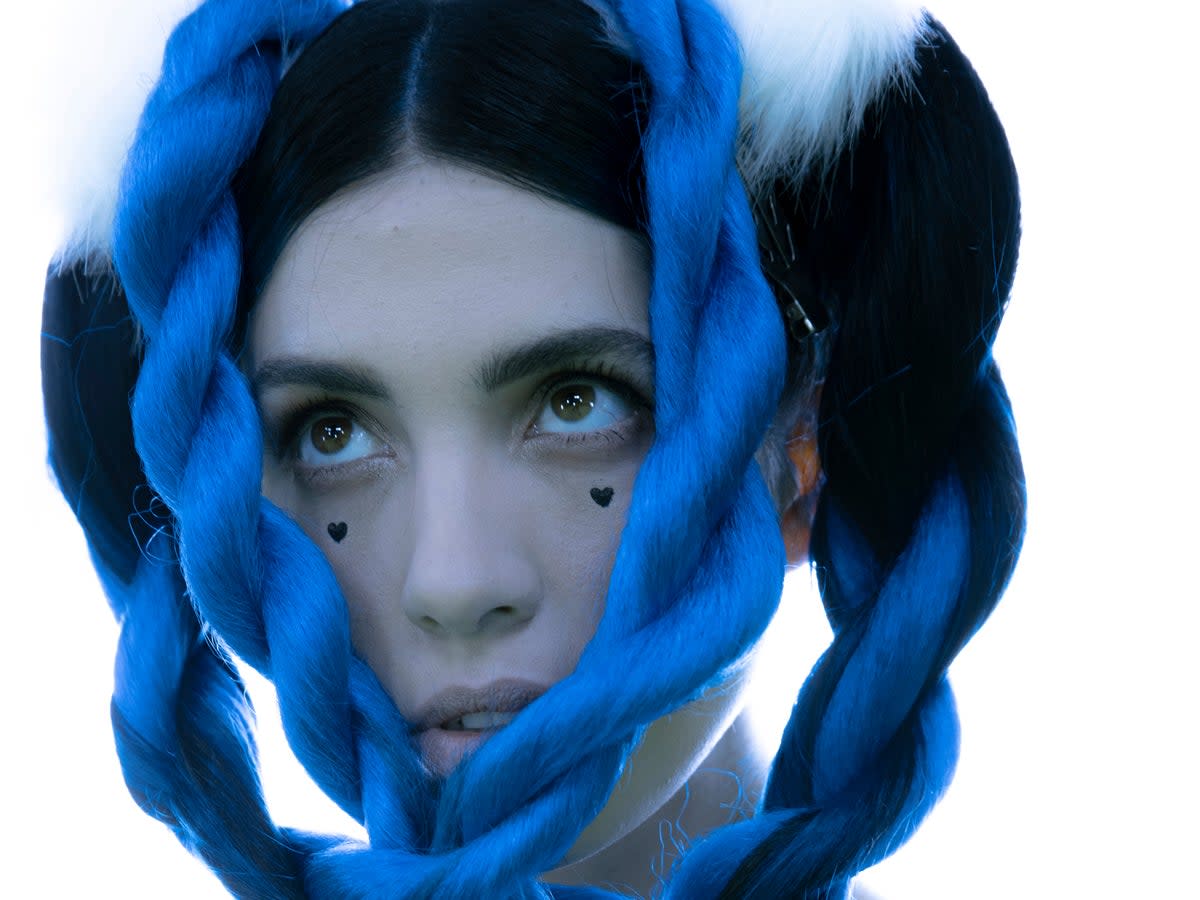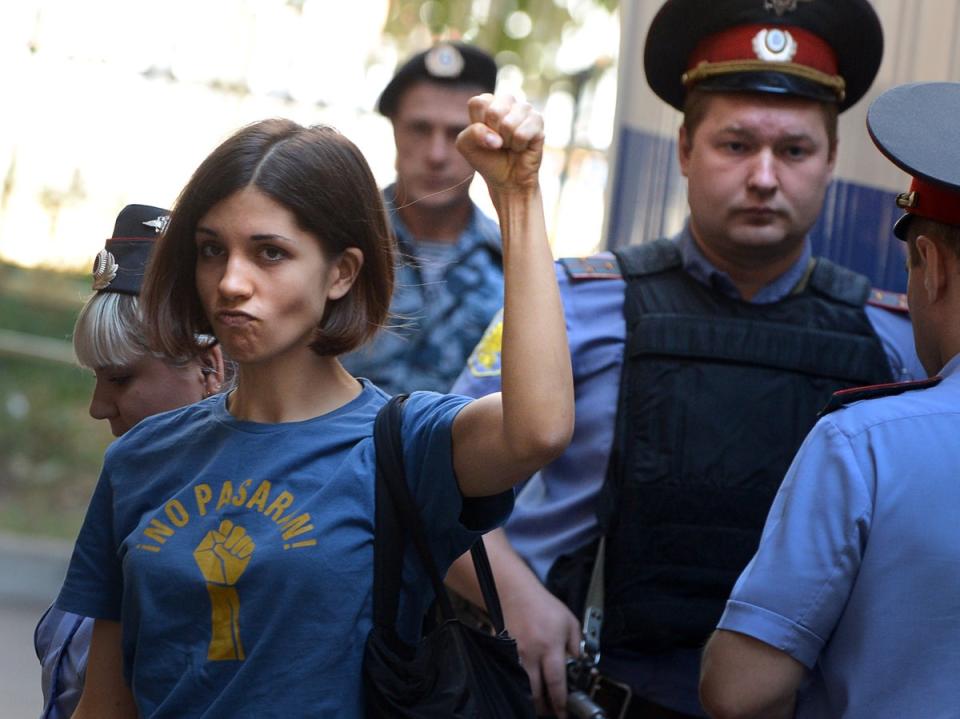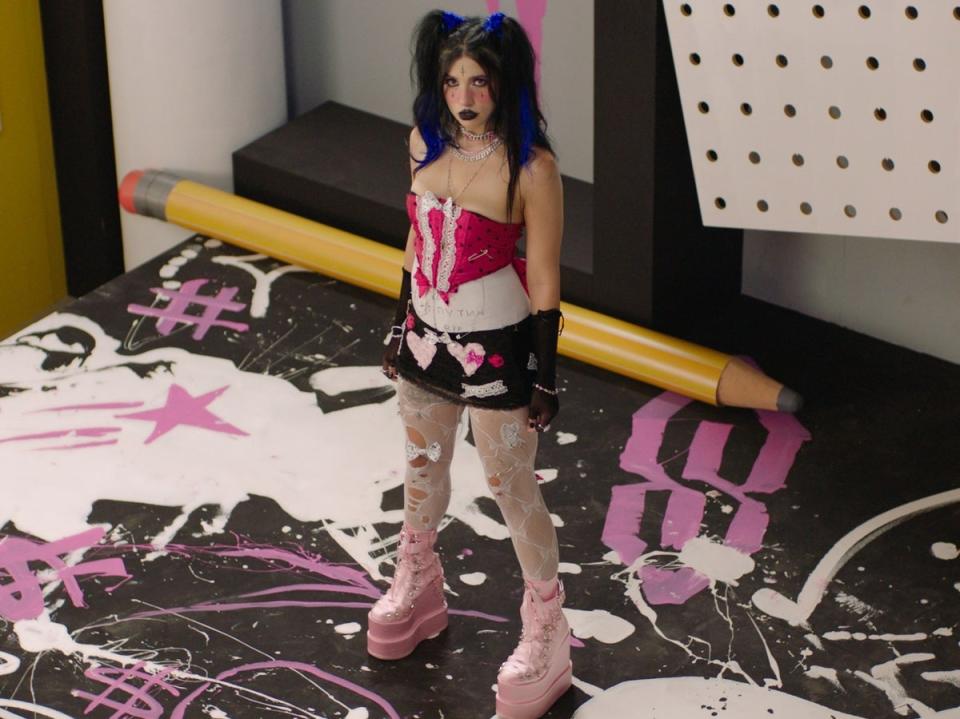Pussy Riot’s Nadya Tolokonnikova: ‘There is no such thing as reverse sexism – meninists can f*** off’

- Oops!Something went wrong.Please try again later.
Sarah Silverman is onstage at the historic El Rey Theatre in Los Angeles, a bright white balaclava pulled unevenly over her head. It squashes her nose across her face, as if she’s doing an impression of a Picasso. “I put it on hastily,” jokes the comedian, but her introduction for the night’s headline act is as sincere as it gets. “They fight for you. They’ve done time. They’re true to their word. They’re not afraid of anyone,” Silverman proclaims. “They are Pussy Riot!”
With those words, 32-year-old musician and activist Nadya Tolokonnikova struts out into the limelight. She’s dressed in vintage lingerie, ripped fishnets and vertiginous knee-high pink boots. Over the next hour and a half, flanked by a pair of balaclava-clad backing dancers, she sings from the mosh pit, cracks a bullwhip and twerks with New Orleans bounce music legend Big Freedia. To begin, she asks simply: “Are you ready to riot?”
What a difference a decade makes. Ten years ago, on 17 August 2012, Tolokonnikova was one of three members of the radical feminist performance art collective Pussy Riot sentenced to spend two years in a remote penal colony. Their crime had been to protest Vladimir Putin’s return to the Russian presidency by walking into Moscow’s Cathedral of Christ the Saviour and dancing around the altar to the strains of their “punk prayer”, a cacophonous song titled “Mother of God Drive Putin Away”.
The trial made headlines around the world, earning the trio the support of Madonna, Björk and Paul McCartney. But global attention did nothing to improve the conditions they were subjected to. In September 2013, Tolokonnikova was hospitalised after five days on a hunger strike in protest at human rights violations at the penal colony in Mordovia. The following year, shortly after her release, Tolokonnikova went to the Winter Olympics in Sochi to once again perform a Pussy Riot punk protest anthem: “Putin Will Teach You to Love the Motherland”. For their trouble, the group were attacked by Cossack militia and beaten with horsewhips.
Clearly, Tolokonnikova, who has continued to speak out against Putin ever since, is made of unbreakable stuff, but there’s a lighter side to her too. When we speak over video call shortly before the show at the El Rey, she’s relaxing at home with a lithe black cat named Ovchuk. With a laugh, she points out that Pussy Riot never intended to become known as a punk band. “We chose punk rock for the first songs just because we thought it was funny,” she says. “I’ve never played the guitar, and none of the core Pussy Riot members ever played any punk rock instruments. I like punk culture, and the punk ethos, but I don’t really listen to punk music that much.” For Tolokonnikova, punk is more about a rebellious attitude than a particular sound. “I’m going to be crucified by so many punks now,” she says. “But if you think you’re a punk just because you’re repeating something that people did in the Seventies, then I’m sorry to tell you, you’re not a punk. You’re a clone.”
These days, Pussy Riot sound very different to the short, sharp screams that first caught the world’s attention. In the years since her release, Tolokonnikova has released a string of one-off singles that have incorporated Pussy Riot’s message into pop and electronic music. In 2016, she released spiky protest track “Make America Great Again” shortly before the election of Donald Trump, while last year she joined forces with Welsh pop artist Marina Diamandis on “Purge the Poison”. Now, for the first time, she’s putting out a Pussy Riot mixtape, Matriarchy Now, a seven-track release featuring collaborations with LA rapper iLoveMakonnen, Texan singer Phoebe Ryan and rising Missouri pop star Slayyyter. The fact that this debut collection coincides with the 10-year anniversary of her imprisonment is, she says, more by accident than design. “There’s no giant thought behind it,” she says, matter-of-factly. “I’ve collected a lot of songs about slutty, dominatrix superheroes.”
That would explain the lingerie, the fishnets and the bullwhip. “This is how I carry myself in the world,” explains Tolokonnikova of her stylised look. “I find it really effective, because it breaks a bunch of stereotypes about gender, sexuality and power. Dominatrix culture is a really potent source of inspiration for me as a feminist, because it turns upside down the models of oppression that have been used on us for ages. Dominatrix culture requires the consent of every party involved. This is a big difference to the classic patriarchal model where women, or anyone who is not a cis, hetero white male, have never been asked if they want to be in a submissive position.”

Tracks like recent single “Plastic” – which reflects on the objectification of women and was accompanied by a music video that cast Tolokonnikova as a young boy’s doll – are Tolokonnikova’s way of playfully questioning gender roles. “Another thing I love about BDSM and dominatrix culture is that they talk a lot about play,” she adds. “This reveals a lot about the nature of human interaction. It’s close to my understanding of gender, because I’m a big fan of the performance theory of gender developed by Judith Butler and others. Through performing different sets of roles you show and solidify your gender, but that means you can also change it because it’s performative.”
Tolokonnikova’s embrace of the look and sound of pop is also deeply connected to her earliest musical influences. She was born in Norilsk, an industrial Russian city so far north it’s inside the Arctic Circle, on 7 November 1989. Two years later, the Soviet Union came to an end. Growing up in Russia in the Nineties, it wasn’t the male-dominated world of rock and metal that attracted her but the promise and potential of pop. “I was born right in the beginning of a new era, so I perceived pop as revolutionary music,” she says. “It sounded, looked and stood for something really different than what mainstream culture stood for during the Soviet era. It was a sign of new hopes, and was connected with the rise of queer culture and us being open to the world for the first time in a century. To be honest, our punk rock and metal scene was much more ‘bro-y’, and I was always attracted to androgynous guys who wear make-up.”
Matriarchy Now is a record full of juxtapositions, mixing candy-sweet vocals with provocative lyrics about sex work and gender norms. It shares its title with protest action Pussy Riot carried out in June, the band unveiling a vast banner reading “Matriarchy Now” inside the Texas State Capitol. Actions like this are just one way that Tolokonnikova turned her beliefs into something tangible following the overturning of Roe v Wade. “I wasn’t surprised, because to me it’s objectively a direct consequence of Trump serving as president. It’s just a bomb that took a second to explode,” says Tolokonnikova. “I don’t really like to talk about my emotions about it, because I’m such an action-oriented person. It doesn’t serve anyone, including yourself, to just sit around being depressed. Which is, by the way, my default! I’ve suffered from depression ever since I got out of jail, so it takes enormous effort for me to actually put myself back in action.”
I think they understand Putin pretty clearly now. He’s just a bloody dictator and a terrorist
Nadya Tolokonnikova
Her work gets results, and she has a keen eye for innovative ways of raising money for the causes she believes in. She explains that the demonstration at the Texas State Capitol was the first protest performance art piece minted on blockchain. “We raised some money with that, and we’re continuing to raise money through every means that we have,” she says. “We’ve so far raised $350,000 (£288,000) for reproductive rights, and 100 per cent of those proceeds went to seven organiations including Planned Parenthood, the Centre for Reproductive Rights and other organisations which help people get access to abortions if they’re in states where abortion is banned.”
Onstage at the El Rey, Tolokonnikova gives a speech that draws a line from her own church-based protest to the influence of the religious right on American politics. A decade on from her initial protests against Putin, she says the Western world has finally realised what she was trying to warn people about. “I think they understand him pretty clearly now,” she states. “He’s just a bloody dictator and a terrorist.”

Given everything she’s been through, Tolokonnikova’s ability to remain motivated and committed is inspirational, but she says everyone has a part to play. “You can choose your own unique path,” she says. “Let’s say you follow Alexandria Ocasio-Cortez. She’s incredibly public. She loves talking to people, and she’s really great at public speeches. Let’s say you’re not. Let’s say you’re an introvert who doesn’t like to deliver speeches. The next thing some people would do is think, oh I’m useless, because I can’t be as effective a politician and activist as AOC. That’s not true. You can contribute in your own unique way – but the bad news is that it’s on you to find your path!” She laughs. “How do I motivate myself? Well, I think to be honest being depressed weirdly helps. It strengthens the muscle I use to try and keep myself afloat every day. I have too many people who depend on me to allow myself to sink into depression, so I think that’s trained me to be demanding of myself, and to come up with simple, actionable steps that I can do every day to remain active and make sure I don’t fall and never wake up.”
It helps too, she says, if you can remember to laugh. Take Matriarchy Now, for example. She knows it’s a slogan that will wind people up. “People regularly write comments on my socials, ‘Why do you want to replace one model of oppression with another one?’,” she says. “Well, first of all, there is no such thing as reverse sexism. All those meninists can just go and f*** off. I don’t believe that matriarchy is a reversal of patriarchy. When we talk about systemic oppression, it’s things that have been formed for thousands of years. We can’t easily reverse that, but what we can do with these systems of oppression is mock them, deconstruct them and analyse them. That’s what I’m doing with Matriarchy Now. It’s a mockery of existing models of oppression, and I think humour is a really good resource for activists. As we like to say in Pussy Riot, the worst crimes against humanity are done by people who take themselves too seriously.”
‘Matriarchy Now’ by Pussy Riot is out now

